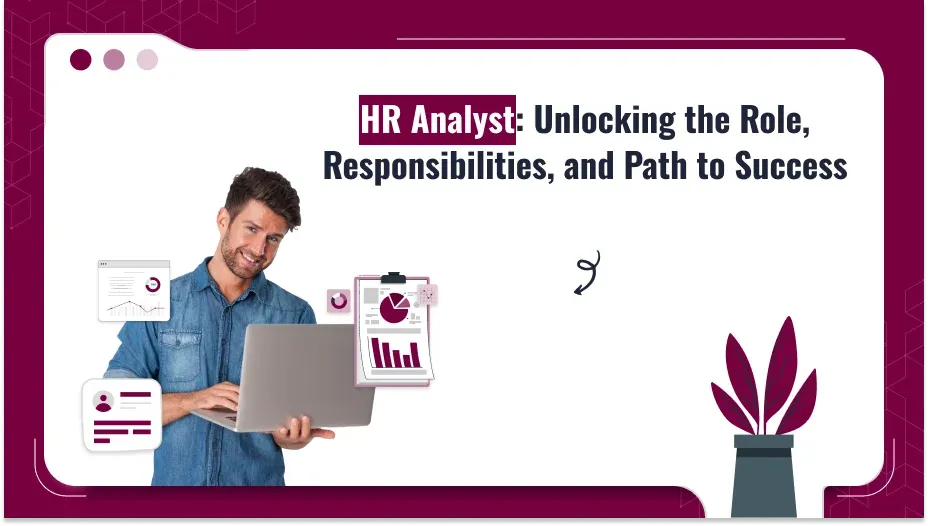
The role of an HR Analyst is to help translate workforce data into executable strategy. Organizations nowadays are under immense pressure to optimize human resource processes and bring them in line with other business goals; this is where HR data analysts come in to assist businesses in tracking trends, enhancing employee engagement, and increasing productivity.
This paper discusses the HR Analyst roles and responsibilities, including how one can become an HR and their implication for modern organizations.
Understanding the HR Analyst Role
An HR Analyst is responsible for collecting and analyzing workforce data to establish insights that guide decision-making. Their work helps ensure that HR departments run more efficiently and strategically. Unlike an HR business analyst, whose focus is on process and systems improvement, HR focus on extracting insights from the data to inform strategies.
What Do HR Analysts Do?
HR translate raw data into recommendations that can be acted upon. Their job entails:
- Collect data from HR systems, surveys, and benchmarks from the outside.
- Analyzing metrics like turnover and engagement, or recruitment efficiency.
- Collaborate with HR Leaders on Workforce Strategies.
Key Outcomes of HR Analysis
HR aim to deliver tangible results, including:
- Better workforce planning.
- Improved employee satisfaction.
- Streamlined hiring processes.
- Enhanced compliance with regulations.
Industries Hiring HR Analysts
HR are in demand across various sectors, including:
- Technology: Optimizing hybrid work models and employee productivity.
- Healthcare: Addressing workforce shortages and burnout.
- Retail: Reduce labor cost; workforce planning.
Key Responsibilities of HR Analyst
HR may play various roles in covering a broad range of tasks designed to improve organizational performance. Key areas include:
1. Data Management and Analysis
This collect and clean data from systems like HRIS, payroll software, and employee feedback platforms. They ensure data accuracy and reliability, which is critical for meaningful analysis.
2. Trend Identification
This can also look into trends regarding turnover, hiring, and engagement, which could help predict challenges and present solutions in advance. For example, they may notice patterns in exit interviews that point to specific retention challenges.
3. Strategic Reporting
HR create detailed dashboards and reports for leadership teams. These visuals help decision-makers track metrics like time-to-hire, retention rates, and employee satisfaction.
4. Employee Sentiment Analysis
Understanding employee sentiment is a vital part of the role. HR Skills measure satisfaction through surveys and engagement tools and then recommends policy adjustments to address concerns.
5. Compliance Monitoring
While compliance monitoring is crucial in all sectors, it is indeed really tough in industries that significantly have compliance requirements.
Their jobs often blend with human resources data analysts and Data Analytics In HR, but their expertise is in a different realm in the HR arena.
Unlock Workforce Insights with HR Analysts!
Organizations leveraging HR analysts have improved workforce efficiency by 30%!
Transform your HR analytics with advanced tools from Superworks!
The Role of HR Analysts in Today’s Organizations
An Analyst offers the insights necessary to turn HR from a functional organization into a strategic organization. Their impact spans multiple areas:
1. Improving Employee Retention
HR identify why employees leave and provide recommendations for interventions, such as changing the compensation structure, introducing career development programs, or improving workplace culture.
2. Improvement of DEI
The use of advanced HRMS Payroll Software in India will ensure that organizations are tracking DEI metrics and have diversity goals rather than pay equity concerns. It results in making the diversity hiring initiatives of an organization efficient and easy to understand by analyzing various inclusion programs at the workplace, along with providing actionable data to deliver equity and inclusion-oriented results.
3. Workforce Planning
Predicting workforce needs ensures businesses can scale effectively without resource shortages or overstaffing. For example, analyzing seasonal trends helps retail businesses prepare for peak seasons.
4. Reducing Costs
By identifying inefficiencies in HR processes, HR contribute to better resource allocation and lower operating costs. For example, they might pinpoint underperforming recruitment channels, saving thousands of dollars annually.
Real-World Examples:
- A technology company reduced turnover by 20% after an HR Analyst highlighted issues in employee onboarding.
- A healthcare provider improves staff scheduling efficiency, saving time and reducing burnout.
A dedicated HR data analyst is, therefore, a strategic asset in any striving business.
How HR Analysts Use Technology
Technology plays a vital role in the success of data analyst HR. They leverage various tools to streamline processes and gain deeper insights.
1. HR Management Software
Platforms like Workday and SAP help manage workforce data efficiently, making it easier for Analysts to track key metrics and generate reports.
2. HR Analytics Tools
With the advanced tools at their disposal, Analyst HR can effectively create visualizations and dashboards that make complex data easier for stakeholders to understand.
3. AI and Predictive Analytics
Artificial intelligence helps HR forecast trends such as employee attrition, workforce needs, and recruitment success. Predictive analytics tools allow them to recommend proactive solutions, ensuring businesses stay ahead of challenges.
4. Automation in Reporting
Because automation eliminates much of the mundane labor involved in simple tasks like report generation and data entry, this frees up HR to focus on strategic initiatives.
How to Effectively Integrate an HR Analyst into Your Team
Involving an HR requires careful planning within the organization. Here’s how to do it effectively:
1. Define Clear Goals
Identify whether the direction is to enhance employee engagement, optimize hiring processes, or improve workforce planning.
2. Provide the Right Tools
Equip them with HR Analytics Tools and data platforms to maximize efficiency.
3. Encourage Collaboration
An this should collaborate with the HR leaders and other departments to harmonize the strategies developed by those parties with the organizational goals. Cross-functional collaboration through regular meetings can incorporate their insights into broader business strategies.
4. Set Measurable KPIs
Define success metrics, such as reducing turnover by a specific percentage or shortening time-to-hire.
5. Offer Training Opportunities
Provide access to certifications and courses in analytics, such as HR Analytics Projects, to ensure continuous growth.
HR Analyst Activities and Skills
To be successful, HR require technical and interpersonal skills. Here is what their job entails:
Daily Tasks
- Monitoring key metrics like time-to-hire and employee engagement analytics.
- Preparing dashboards for leadership.
- Conducting predictive analyses to forecast trends.
Core Competencies
- Technical Skills
- Proficiency in HR software like HRMS Payroll Software in India.
- Familiarity with SQL, Tableau, and Excel.
- Soft Skills
- Communication: They have to communicate data insights to nontechnical stakeholders.
- Problem Solving: They need to come up with actionable solutions based on trends.
- HR Knowledge
How to Become an HR Analyst
Want to be an HR? Follow these steps:
1. Educational Requirements
A bachelor’s degree in Data Analytics In HR, or business is a strong foundation.
2. Certifications
Pursue certifications like SHRM-CP or People Analytics programs to enhance your credentials.
3. Technical Skills Development
Learn tools like Tableau, SQL, and Power BI. Practical experience in HR analytics is a big plus.
4. Gaining Experience
Start in entry-level HR positions focusing on data-related work.
5. Networking
Connect with HR professionals and try workshops to keep abreast of the latest trends in the industry.
Common Challenges Faced by HR Analysts
HR Analysts encounter various challenges, including:
- Incomplete Data: Working with fragmented or inaccurate datasets.
- Stakeholder Buy-In: Gaining leadership buy-in on actions to take based on data insights.
- Keeping Up with Trends: Staying ahead in a rapidly evolving field.
Conclusion
An HR Analyst is more than just a data expert; they are strategic partners in organizational success. By identifying trends, improving processes, and supporting better decision-making, HR ensure that HR departments contribute to broader business goals.
Whether you’re considering hiring an HR Analyst or pursuing a career Analytics In HR, now is the time to act. With the right tools, skills, and strategies, HR can help businesses thrive in a data-driven world.






